An inside look at the US troop withdrawal from Afghanistan: ABC News exclusive
The top U.S. general directing the full withdrawal of all 2,500 American troops from Afghanistan acknowledged in an exclusive interview with ABC News chief Global Affairs correspondent Martha Raddatz that the security situation in the country is "not good" and that the Taliban's push to seize parts of the country is "concerning."
Gen. Austin Scott Miller said he stands by his belief that there cannot be a military victor in Afghanistan, but he told Raddatz that as the Taliban continues with its military operations across the country, while also engaging in peace talks, "you're starting to create conditions here that doesn't -- won't look good for Afghanistan in the future if there is a push for a military takeover" that could result in a civil war.
"I think what you're seeing -- just if you look at the security situation -- it's not good," Miller told Raddatz. "The Afghans have recognized it's not good. The Taliban are on the move."
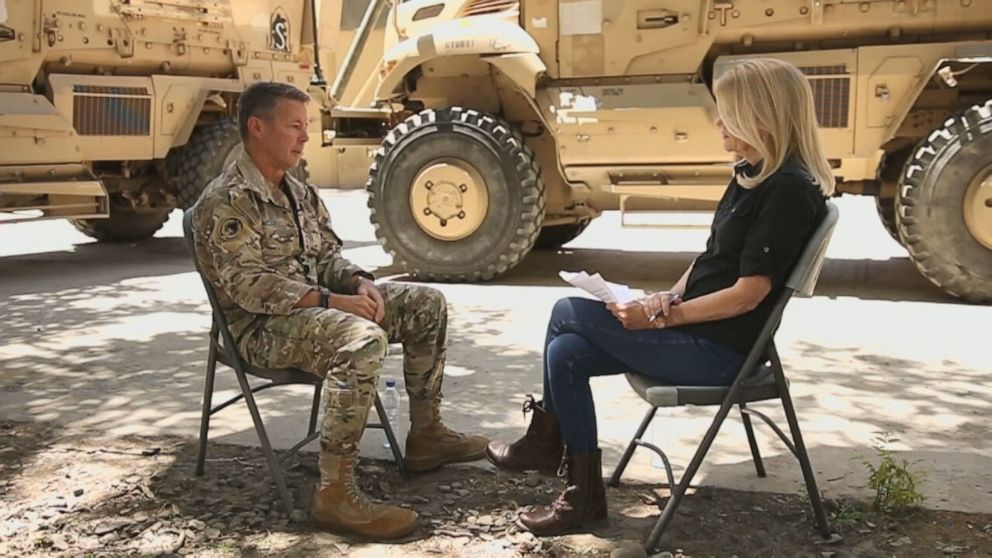
Miller explained that while the Taliban are participating in peace talks in Qatar with the government of Afghanistan and expressing sentiments favoring a political settlement "you have an offensive operation going on across the country by the Taliban."
He has previously said neither side can win militarily in Afghanistan.
"I still stand by those words," Miller said. "You're starting to create conditions here that doesn't won't look good for Afghanistan in the future if there is a push for a military takeover.
Miller said "we should be concerned" by reports of increasing Taliban violence as Taliban fighters have seized dozens of Afghan government district centers throughout Afghanistan.
"The loss of terrain and the rapidity of that loss of terrain has to be a concerning one," Miller said, noting that it can lower morale among military forces and civilians. "So as you watch the Taliban moving across the country, what you don't want to have happen is that the people lose hope and they believe they now have a foregone conclusion presented to them."
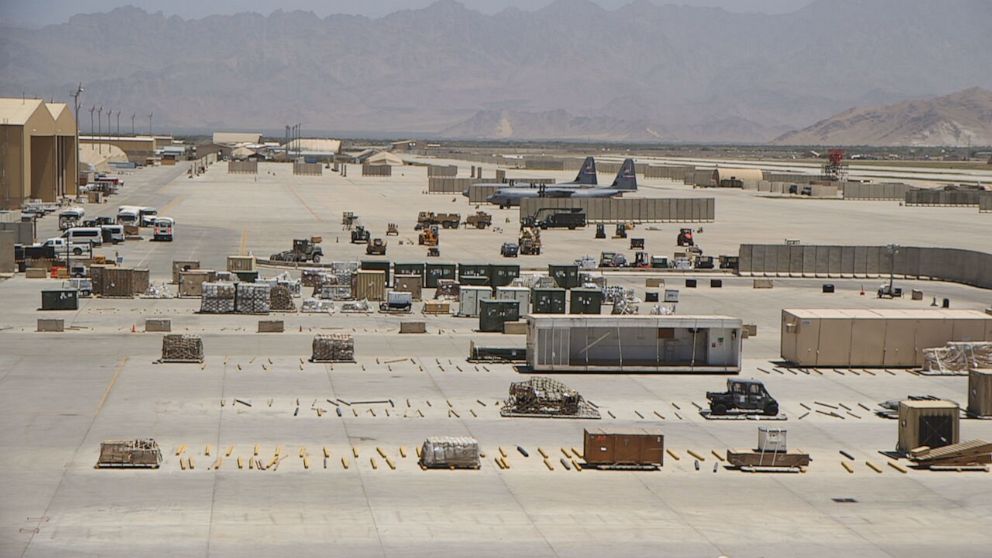
Miller said Afghanistan's new Defense Minister Bismillah Mohammadi "understands the gravity of the situation" and is moving to strategically consolidate Afghan security forces to maintain the fight against the Taliban and not necessarily defend every district center.
"They're going to need to do that" Miller said, and "they're going to have to choose where they want to fight the Taliban as they continue to move forward."
Miller also said he understood concerns by residents in Kabul that the Taliban would like to attack Afghanistan's capital in the future.
"If you go back to what the Taliban's objectives are, they want to take over and so at some point that implies that at some point they are in Kabul," he said. "And certainly some of them remember what it was like the last time under with the Taliban regime."
Departing Bagram
ABC News accompanied Miller to the sprawling Bagram Air Base located 40 miles east of Kabul that is the main transportation hub for the hundreds of cargo flights that have taken out U.S. military equipment and personnel over the past two months.
"Where we're standing right now is this equipment that's waiting to get on aircraft and that will redeploy from Afghanistan as part of our order in retrograde," Miller told Raddatz, using the military's official term for the full withdrawal.
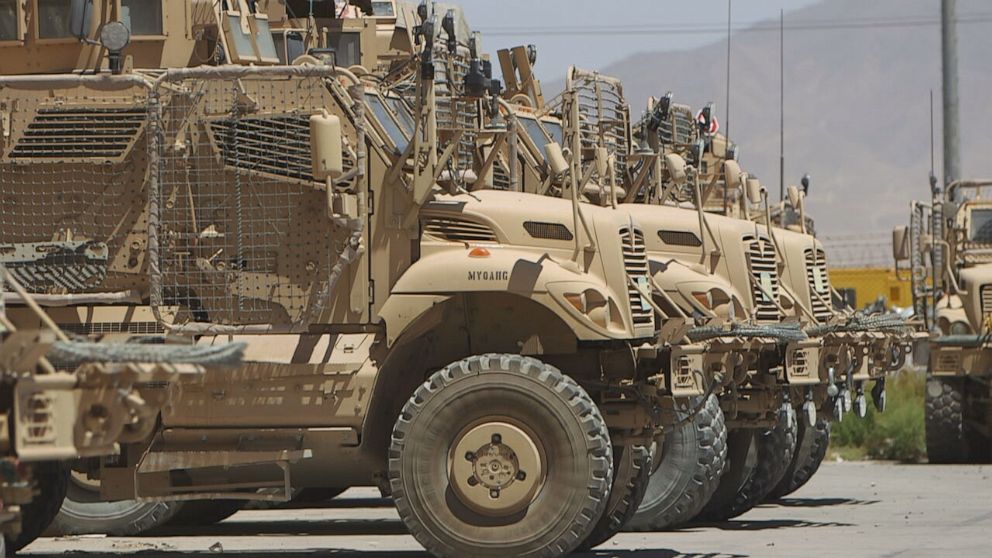
"What's happening here is also happening at other airfields around the country, particularly in the north," said Miller, who stressed that the objective is for a safe and orderly withdrawal that will protect American and coalition forces as they depart the country.
Ultimately Miller said that the base would be turned over to Afghan security forces, much as is happening with other U.S. inventory in the country.
"The idea is that there is equipment that stays here that supports them, certainly in a strategic airfield," said Miller. "But again, we're looking to make sure that they have the ability to absorb it and secure it as we go forward.
More than half of the U.S. military equipment in Afghanistan has already been shipped out of the country as the U.S. forces quickly move towards pulling out all U.S. troops from Afghanistan by Sept. 11, as ordered by President Joe Biden. But it appears that the withdrawal could be completed much sooner than that with one U.S. official telling ABC News that it could be completed as soon as July.
The pace of the operations at Bagram has been eye-opening for the experienced logistics officers in charge of the operation.
"It's a little surreal to see things very bare and empty," said Col. Erin Miller, a logistics officer overseeing the withdrawal. "And as we continue to move forward with the retrograde, seeing the equipment leave out, it truly is surreal."
Maintaining security
With all the billions of dollars the United States has invested in training and equipping Afghanistan's security forces, it will be up to them to maintain security.
"What we've said is this is Afghanistan, this is their country," said Miller. "The Afghan security forces have to hold."
The U.S. military will continue to provide Afghan forces with financial support and continued assistance for Afghan air force maintenance crews, but as the U.S. completes its withdrawal, there will not be a physical U.S. military presence in Afghanistan aside from the hundreds of personnel who will be stationed at the U.S. embassy in Kabul.
Americans will also continue to fly "over-the-horizon" reconnaissance missions and counterterrorism missions from countries in the Persian Gulf area focused on al-Qaida and the Islamic State group, not the Taliban.
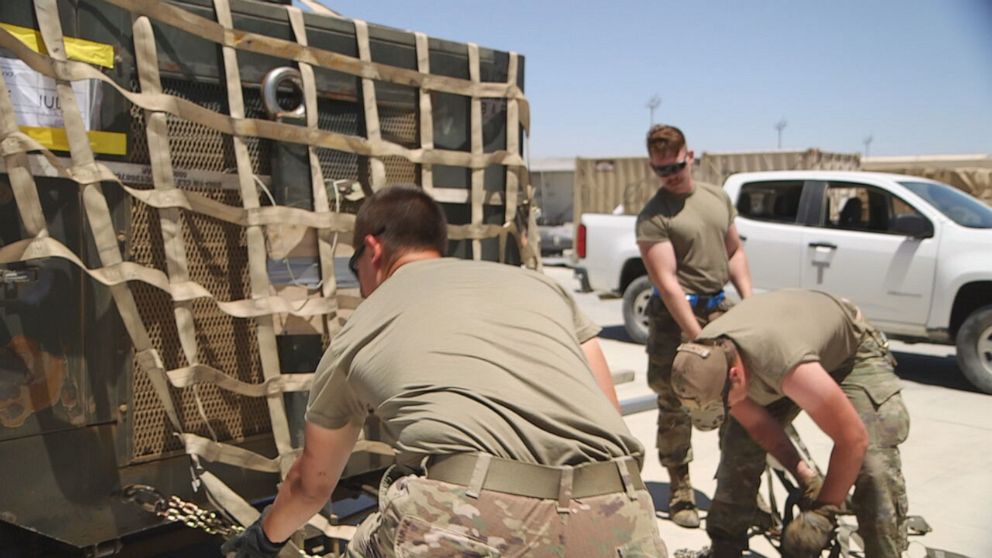
While the U.S. is continuing to provide defensive airstrikes in support of Afghan ground troops during the withdrawal, U.S. Central Command's Gen. Frank McKenzie has indicated that airstrikes later will only be directed against the two terror groups if they are planning to attack the American homeland or allies.
Miller praised the effectiveness of Afghanistan's Air Force but indicated that the possibility of U.S. defensive airstrikes in the future will continue "to be discussed as we move forward."
"I think we need to see how that how that lands," he told Raddatz.
The withdrawal in Afghanistan after an almost 20-year presence has drawn comparisons to the 2011 U.S. withdrawal from Iraq, which created a security vacuum that led to the rise of ISIS and the eventual return of U.S. forces in 2014.
"Do you think about Iraq when we're leaving here and what happened in Iraq when we left?” Raddatz asked Miller.
“Absolutely, I mean that's on everybody's mind," said Miller. "These are judgments that we have to make balanced against our national interests."
Friends in need
Miller first served in Afghanistan in December, 2001 as a special operations commander and has deployed at least eight other times to Afghanistan, Iraq and other locations.
As he prepares to leave Afghanistan for the final time Miller described mixed feelings both professionally and personally.
"On the professional side, what you're seeing is a -- what I would call -- a historic retrograde being done under at least the threat of conflict," said Miller. "So far, it has not been contested, at least to date. So you see that and you know the goodness that's taking place there, watching our service members as well as our allies doing this as professionally as possible."
He said that after 20 years he has developed friends in Afghanistan, but "I don't like leaving friends in need and I know my friends are in need."
"As we continue to move down the retrograde and withdraw forces, there's less and less I can directly offer them in terms of assistance," he said. "So that's hard."
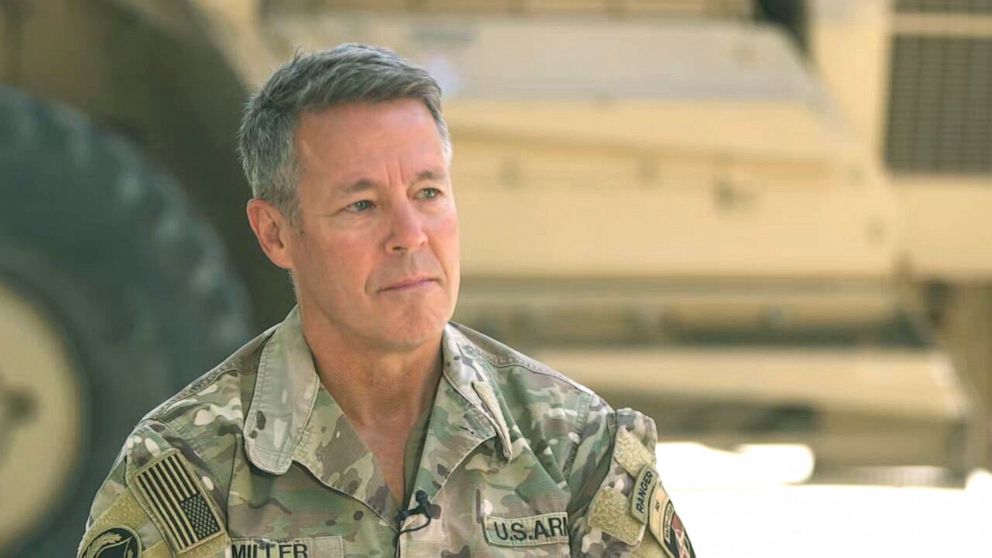
For example, he said Afghan Defense Minister Mohammadi has asked him occasionally for some type of assistance -- provided in years past -- and "there's points where I have to tell him I won't be able to do that."
"It's a tough, tough business, it is tough," said Miller.
"We knew we were going to have to leave at some point," he continued. " I don't know that you could find a right time, but so know what you are trying to do is, as you depart, ensure that the security assistance that can continue does continue; that you keep those lines open. So even as we discuss -- we call it ‘departure’ -- it doesn't mean a full break of the relationship."
Gen. Haibatullah Alizai, the commander of the Afghan Army's Special Operations Command acknowledged that there will be challenges ahead for Afghanistan's military, but he expressed confidence that his forces and Afghanistan will be able to endure after all U.S. troops have left Afghanistan.
"Absolutely, we will survive," said Alizai. "Afghanistan will survive."
"We have learned a lot from our friends and partners in the last two decades," he said. "Based on those lessons we are going to expand and extend and make our army great to make Afghanistan keep the situation in Afghanistan the same or better than today. "
"I'm really optimistic about this and we are really committed to this fight against terrorism and to keep Afghanistan safe for the future," said Alizai.



